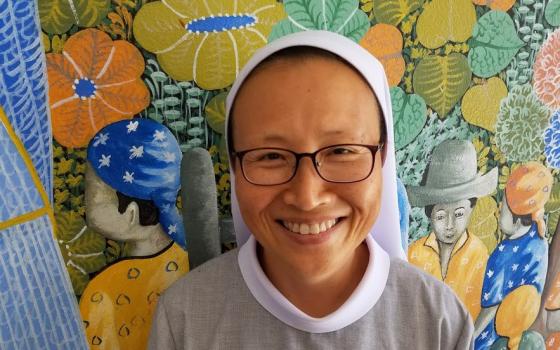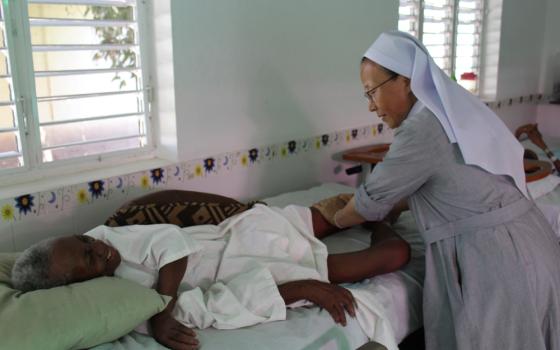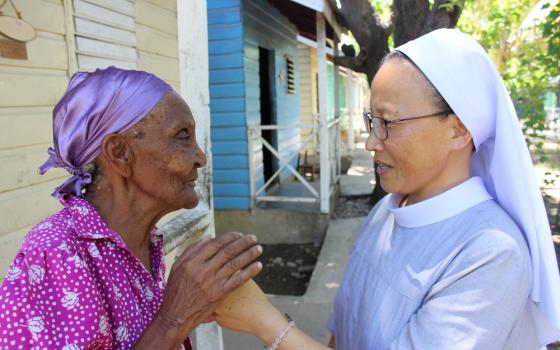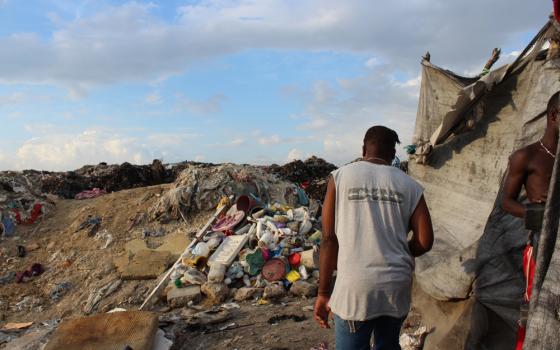Sr. Matthias Choi heads the Haiti mission of the Kkottongnae Sisters of Jesus, a South Korean congregation with a 30-year history of work in poor communities throughout the world. The congregation is part of the larger Congregation of Kkottongnae Brothers and Sisters founded by Korean Fr. John Oh Woong-Jin.
The mission of Kkottongnae, which means "Flower Village" in English, is in welcoming and feeding "those people who have been abandoned by their families and by society and who are silently wasting away on streets and under bridges," according to a congregational history. In Haiti, the congregation's work includes doing just that — feeding and assisting those who have been abandoned on the streets. But the congregation also provides food and care for those living in places of great need, such as the landfill area called Trutier, just outside the Haitian capital, Port-au-Prince.
In addition, the congregation runs a village for the elderly, abandoned adults and children in a communal area in Croix-des-Bouquets, outside of the capital, that provides housing and medical care for its residents. It is also where Kkottongnae Haiti is based.
Three Kkottongnae sisters and two brothers work at the village, aided by dozens of volunteers and a small staff. Various humanitarian groups help fund the work, including the interdenominational group Food For The Poor. In Haiti, most seniors still live with their families, so the village is something of a rarity. But Choi, 49, a nurse practitioner, believes that because the country is becoming more urbanized, the village is a pioneer in care for the elderly.
GSR: Not many people outside Korea know about your congregation. Tell us about it.
Choi: In 1976, Fr. John Oh, who just graduated from Gwangju Catholic University, served as the pastor of Mugeuk Catholic Church after being ordained a priest. One day during that period, Fr. Oh met an elderly homeless man, with a begging bowl in hand, named Choi Gui-dong. Choi was taking care of 18 other homeless people. What is surprising is that Choi was physically less able to care for others and actually needy himself.
Fr. Oh was stunned. Choi's devotion and sacrifice for less fortunate people than himself impressed Fr. Oh, and he realized this truth: Even if you have only the strength to beg for food, it is the blessing of the Lord.
Inspired by the experience, Fr. Oh established Kkottongnae. Fr. Oh started immediately building a shelter and named it House of Love. From that humble house, the Kkottongnae community has developed a network in South Korea that includes 4,000 residents in shelters and homes, 1,000 workers, and religious brothers, sisters and priests — about 300 sisters and about 100 brothers work together. Among the brothers are 10 priests. It is one of nation's largest general welfare facilities.
This year, Kkottongnae celebrated our 40th anniversary, and it has been 30 years since Bishop Nicholas Cheong of the diocese of Chong Ju in South Korea gave the authorization for Kkottongnae sisters and brothers of Jesus as a religious congregation. Now Kkottongnae is turning to the rest of the world: Besides South Korea, we work in the Philippines, the United States, Bangladesh, Uganda, Canada, Indonesia, India, Paraguay and Argentina as well as Haiti.
Tell us about your experiences in Haiti.
I have been here since 2012, and these have been very blessed years for me. We take seriously the verse from Matthew 25:40: "Truly I tell you, whatever you did for one of the least of these brothers and sisters of mine, you did for me." In the case of the village, we have 230 people here, mostly elderly, and some who have been abandoned on the streets and at the hospitals, with nowhere else to go. Maybe they have family or neighbors they can't return to, or they are very sick. We welcome people here, and once we accept them, this becomes their home.
Once they get well, they serve others who need help in the village. But this is not only a "welfare facility" but a salvation community, with many deciding to be baptized. If they are facing death, we give them anointments and help prepare them for death. We bury them at the cemetery. Overall, it's a refuge for people, like an oasis in the desert. Outside of the gates, it can be dirty and dusty. But here, because of the trees and shade, it is cooler. It's easy to breathe.
How do people get here?
Most are from Port-au-Prince. Eight out of 10 are elderly; the rest are mentally ill. It's case by case: Some are brought here by neighbors who know of people who need care, and others are people we find on the street. We ask, 'Do you want to come with us?' Sometimes, the mentally disabled won't answer, but eventually, people accept our offer. Maybe there have been four or five cases of people saying no, but we keep trying to approach them in order to provide a better life for them. We can accommodate about 250 people.
What is your charism?
Our focus is on "the least one who even does not have energy to beg for food." Some people call us "The Good Samaritan." The idea that even if you have only the strength to beg for food, it is the blessing of the Lord.
What is the situation with the elderly in Haiti?
I think in the rural areas, there is respect for the elderly, but the situation is different in Port-au-Prince. One example is that funeral costs here are very high — families cannot afford to pay the funeral. That is a shame for the elderly. Also, many NGOs in Haiti are focused on children, and that work is important for their future. But there are not a lot [of NGOs] taking care of the elderly. So we are serving a need. We also provide another need because we welcome many different Haitian nursing-school students as a group for geriatric practicum. They learn how to care and serve for the elderly with their knowledge.
What are the particular challenges working in Haiti?
The country is so poor. Hunger is a real problem. People are constantly saying, "I'm hungry." That is hard to deal with. How much, how far do I go to help them? Give them? These are daily questions in areas we work, like the landfill area.
As for the village here, we provide three meals a day: macaroni often for breakfast; rice, beans and sometimes some kind of meat for lunch. Dinner is often soup. We get much of this food from Food For The Poor. They gave us this village as a gift in 2012 and still they are a big supporter.
We have no support from the Haitian government. With about 230 people in the village and about more than 1,000 people in the landfill, I have to become a beggar to help them. I've been to New Jersey, Georgia and Toronto to fundraise. Of course, much of our funding comes from South Korea.
Do Haitians donate money?
Yes. We have started a membership program where Haitians give us at least $1 donations. The number of people who joined the membership program is going up to 100. They are mostly small amounts, just $1 a month, $12 a year, but that's important. It's a miracle in some ways. When I first came to Haiti, I never thought that would be possible because they are too poor to donate even their pennies. The bank system is not good, so it takes time to collect the money by visiting them.
We celebrate a special Mass for the donors who support Kkottongnae Haiti every last Saturday. These donations are a big change. By helping the poor, we give them hope, and they give us hope to do our mission in Haiti to glorify God. They show support for our work and also show that Haitians want to help other Haitians. When you share things, even if it's a small amount, it's like a theme in the Bible: "Give to all."
How has your work been affected by the recent hurricane?
Thankfully, we did not have any damage in the village, and most of Port-au-Prince was spared.
However, Fr. Oh collected $10,000 to help the survivors in Haiti. So we gave it to the diocese of Jeremie through the apostolic nuncio. I cannot say, "Thank God we are safe from the hurricane" because there are many victims. We truly need to pray for the victims, whether they are alive or dead, because they took the suffering instead of us.
How do you think the Holy Spirit is working through your work in Haiti? And what is the basis for your spirituality?
Every Sunday evening after vespers, we have a charismatic prayer meeting. During the prayer meeting, we can deeply concentrate on God and listen to God's message for us. The Holy Spirit makes us one, and even though we have conflicts between brothers and sisters, it does not last long. This is very important in the community life for the religious.
Every moment, I try to be sensitive to how the Holy Spirit guides me, what God wants me to do and what I also have missed doing or neglected to do. For example, when I visited the landfill for the very first time, I was afraid to enter the area because it seemed like a slum area. I imagined that people would have guns and would be violent to strangers. So I refused to help them for almost a year because it I thought it was too dangerous and because it seemed there were too many hungry people to help with my small hands.
However, I felt God kept poking me to go and see what I could do for them. God was waiting for me with great patience until my fear disappeared and I was ready to move.
[Chris Herlinger is GSR international correspondent. His email address is cherlinger@ncronline.org.]




